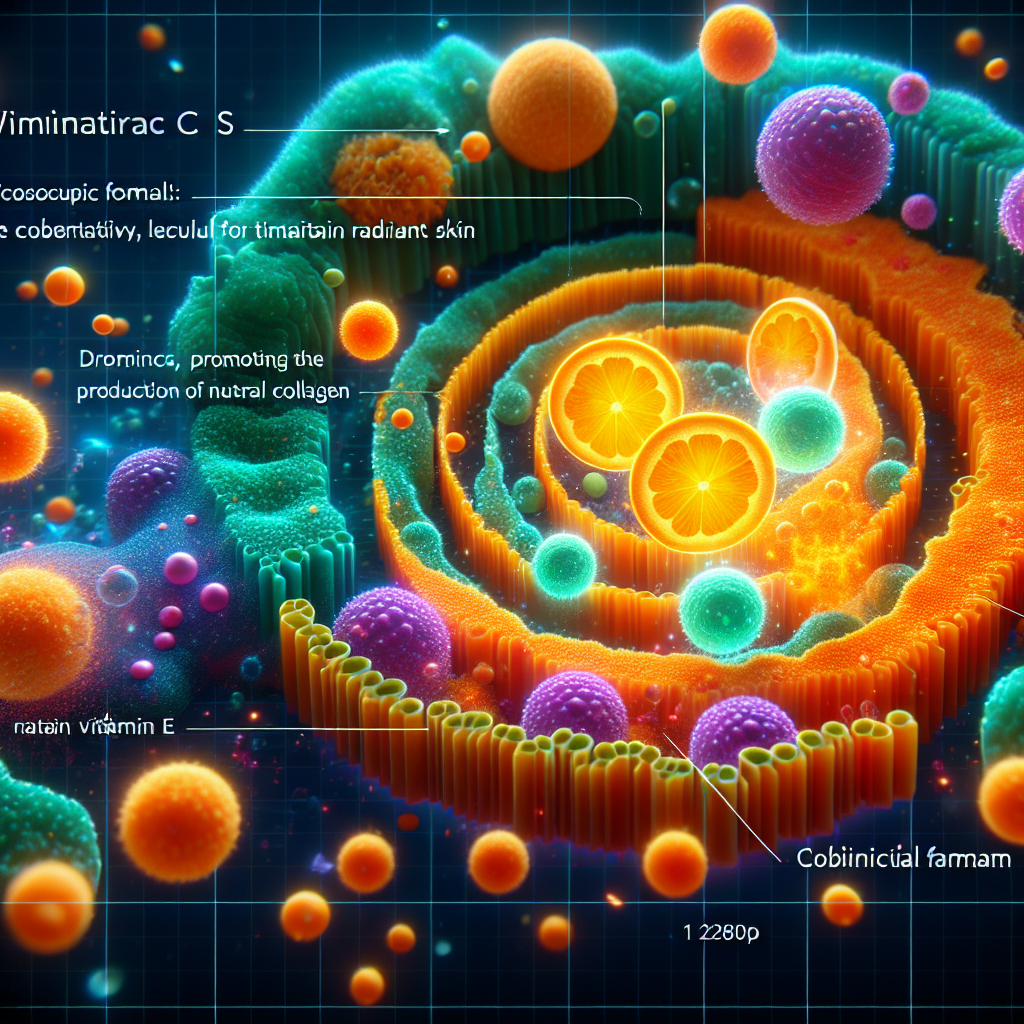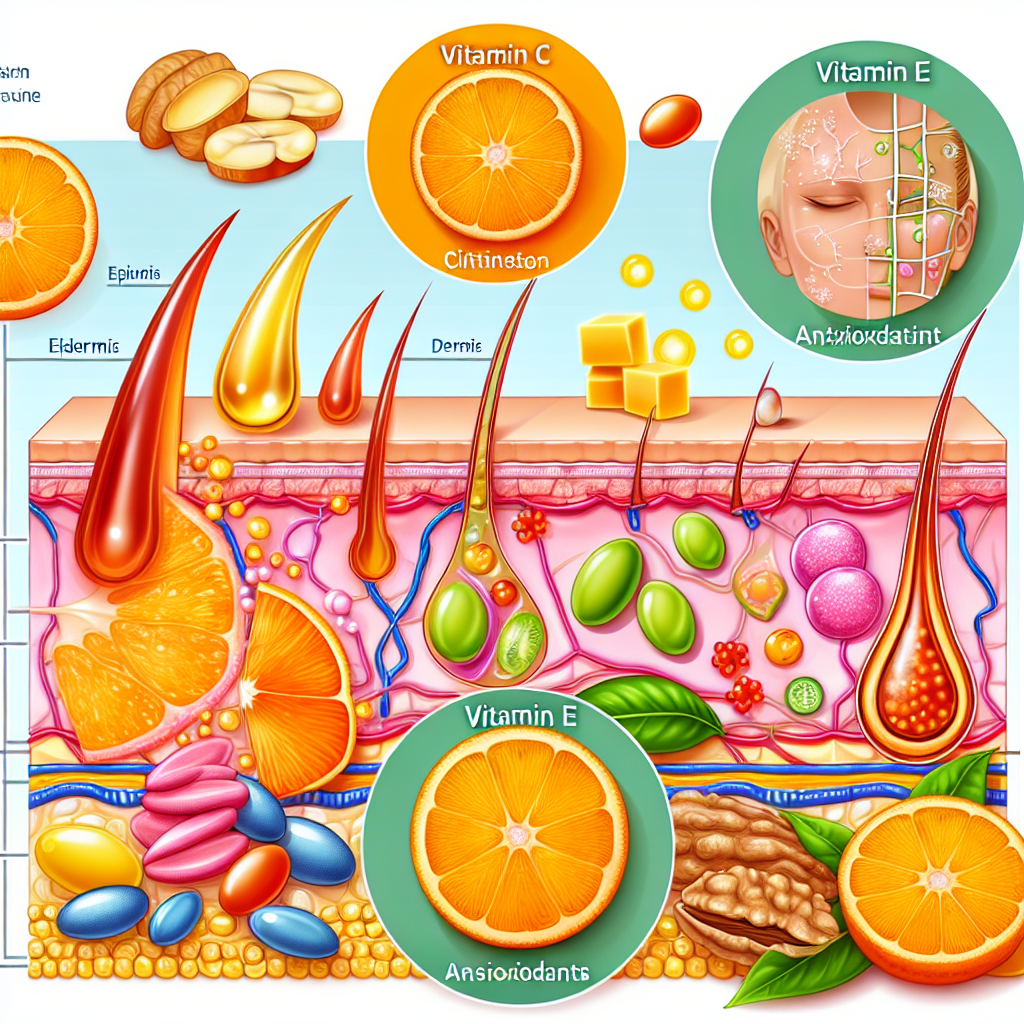How Vitamin C and E Keep Your Skin Glowing

Discover the secret to glowing skin with Vitamins C and E! Learn how these essential nutrients can enhance your skin’s health and give you that radiant glow you’ve always wanted. Don’t wait, start your journey to vibrant skin today. Click here to find out more.
The Role of Vitamin C and E in Achieving Glowing Skin
The quest for glowing skin is a journey that many embark on, but few truly understand the science behind achieving that radiant glow. The secret lies not in expensive creams or invasive procedures, but in the power of vitamins, specifically Vitamin C and E. These two vitamins play a crucial role in maintaining skin health and promoting a natural glow.
Vitamin C, also known as ascorbic acid, is a potent antioxidant that aids in your skin’s natural regeneration process. It helps your body repair damaged skin cells, leading to healthier and more radiant skin. It also plays a significant role in collagen synthesis. Collagen is a protein that gives your skin its structure and elasticity. As we age, our bodies produce less collagen, leading to wrinkles and sagging skin. By boosting collagen production, Vitamin C helps maintain your skin’s youthful appearance.
Moreover, Vitamin C has a brightening effect on the skin. It inhibits the enzyme tyrosinase, which is responsible for converting tyrosine into melanin, the pigment that gives your skin its color. By reducing melanin production, Vitamin C can help fade dark spots and even out your skin tone, giving you a brighter and more glowing complexion.
On the other hand, Vitamin E is another powerful antioxidant that protects your skin from damage caused by free radicals. Free radicals are unstable molecules that can damage the cells in your body, including your skin cells. They are produced by your body in response to environmental stressors like pollution and UV radiation. By neutralizing these free radicals, Vitamin E helps prevent premature skin aging and maintains your skin’s health.
Vitamin E also has moisturizing properties. It strengthens the skin’s barrier function, which helps keep moisture in and harmful substances out. This leads to softer, smoother, and more hydrated skin. Moreover, Vitamin E has anti-inflammatory properties. It can help soothe and calm irritated skin, reducing redness and inflammation. This makes it particularly beneficial for those with sensitive or acne-prone skin.
Combining Vitamin C and E can provide even more benefits for your skin. When used together, these vitamins work synergistically to provide enhanced protection against environmental damage. Vitamin C primarily protects your skin from damage caused by free radicals during the day, while Vitamin E helps repair and rejuvenate your skin at night. This powerful combination can help you achieve and maintain glowing skin.
In conclusion, Vitamin C and E play a crucial role in achieving glowing skin. They protect your skin from damage, promote skin regeneration, boost collagen production, and provide hydration. By incorporating these vitamins into your skincare routine, you can achieve healthier, more radiant, and glowing skin. However, it’s important to remember that while these vitamins can significantly improve your skin’s appearance, they are not a substitute for a healthy lifestyle. Regular exercise, a balanced diet, and adequate sleep are also essential for maintaining your skin’s health and glow.
Unlocking Radiant Skin: The Power of Vitamins C and E

Unlocking radiant skin is a quest that many embark on, but few truly understand the power of vitamins in achieving this goal. In particular, vitamins C and E have been hailed as the secret weapons for maintaining a youthful, glowing complexion. These vitamins are not just essential for overall health, but they also play a significant role in skin care.
Vitamin C, also known as ascorbic acid, is a potent antioxidant that aids in the body’s natural regeneration process. It helps to repair damaged skin cells, leading to healthier and more radiant skin. It is also crucial in the production of collagen, a protein that gives the skin its elasticity and firmness. As we age, our bodies produce less collagen, leading to wrinkles and sagging skin. By boosting collagen production, vitamin C can help to slow down the aging process and keep the skin looking youthful and vibrant.
Moreover, vitamin C has been found to have skin brightening properties. It can help to fade pigmentation and smooth the skin’s surface to reduce dullness. This leads to a more even skin tone and a brighter complexion. It also helps to protect the skin from damage caused by harmful UV rays and environmental pollutants. This is because vitamin C neutralizes the free radicals that are produced when the skin is exposed to these elements, preventing them from causing damage.
On the other hand, vitamin E is another powerful antioxidant that works in several ways to protect and nourish the skin. It helps to neutralize free radicals, which can damage cells and accelerate the aging process. Vitamin E also has moisturizing and healing benefits, making it an excellent choice for dry and damaged skin. It strengthens the skin’s barrier function, reducing water loss and keeping the skin hydrated and supple.
Vitamin E also works synergistically with vitamin C. When used together, they can provide a higher level of protection against damage caused by exposure to UV rays. Vitamin E absorbs the harmful UV light from the sun, preventing it from reaching the skin. Meanwhile, vitamin C helps to neutralize the free radicals that are produced as a result of this exposure. This combination of actions helps to prevent the signs of premature aging, such as wrinkles and fine lines.
Incorporating these vitamins into your skincare routine can be done in several ways. Many skincare products, such as serums, creams, and lotions, contain these vitamins. When choosing these products, it’s important to look for those that have a high concentration of these vitamins to ensure their effectiveness. Alternatively, you can also get these vitamins from your diet. Foods rich in vitamin C include citrus fruits, strawberries, and bell peppers, while vitamin E can be found in nuts, seeds, and spinach.
In conclusion, vitamins C and E are powerful tools in the quest for radiant skin. They offer a multitude of benefits, from boosting collagen production to protecting the skin from damage. By incorporating these vitamins into your skincare routine and diet, you can unlock the secret to a youthful, glowing complexion.
Vitamin C and E: Essential Nutrients for Skin Glow
Vitamin C and E are essential nutrients that play a significant role in maintaining the health and glow of your skin. These vitamins are potent antioxidants that protect the skin from harmful free radicals, promote collagen production, and aid in skin repair and regeneration.
Vitamin C, also known as ascorbic acid, is a water-soluble vitamin that is crucial for the synthesis of collagen, a protein that provides structure and elasticity to the skin. As we age, our skin’s collagen production decreases, leading to wrinkles and sagging skin. By boosting collagen production, vitamin C helps to maintain the skin’s firmness and elasticity, giving it a youthful and radiant glow.
Moreover, vitamin C is a powerful antioxidant that protects the skin from the damaging effects of free radicals. Free radicals are unstable molecules that can cause oxidative stress, leading to premature aging and skin damage. By neutralizing these harmful molecules, vitamin C helps to prevent skin aging and promotes a healthy, glowing complexion.
In addition to its antioxidant properties, vitamin C also has brightening effects. It inhibits the enzyme tyrosinase, which is responsible for the production of melanin, the pigment that gives skin its color. By reducing melanin production, vitamin C can help to lighten dark spots and hyperpigmentation, resulting in a more even and radiant skin tone.
On the other hand, vitamin E, also known as tocopherol, is a fat-soluble vitamin that is also a potent antioxidant. It protects the skin from the damaging effects of ultraviolet (UV) radiation, one of the main causes of premature skin aging. By absorbing UV radiation, vitamin E helps to prevent sunburn, DNA damage, and other harmful effects of sun exposure.
Furthermore, vitamin E has moisturizing properties that help to maintain the skin’s hydration and barrier function. It strengthens the skin’s protective barrier, preventing moisture loss and keeping the skin hydrated and plump. By maintaining the skin’s moisture balance, vitamin E helps to give the skin a healthy and glowing appearance.
Vitamin E also aids in skin repair and regeneration. It accelerates the healing of skin injuries and reduces the appearance of scars. Moreover, it enhances the effectiveness of vitamin C, making these two vitamins a powerful combination for skin health and glow.
In conclusion, vitamin C and E are essential nutrients that provide numerous benefits for the skin. They protect the skin from free radicals and UV radiation, boost collagen production, aid in skin repair and regeneration, and maintain the skin’s hydration and barrier function. By incorporating these vitamins into your skincare routine, you can help to keep your skin healthy, youthful, and glowing.
However, it’s important to note that while topical application of these vitamins can provide significant benefits, a balanced diet rich in these nutrients is also crucial for overall skin health. Foods such as citrus fruits, berries, nuts, and seeds are excellent sources of vitamin C and E. So, remember to nourish your skin from the inside out for the best results.